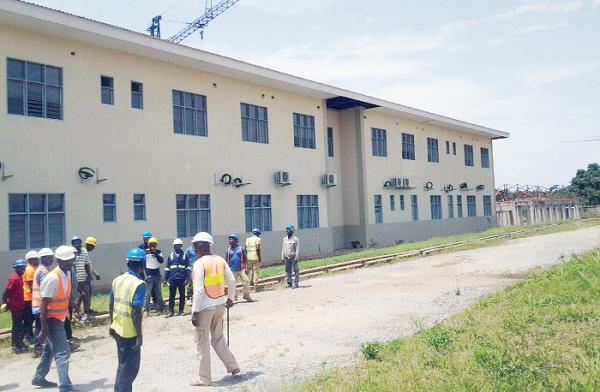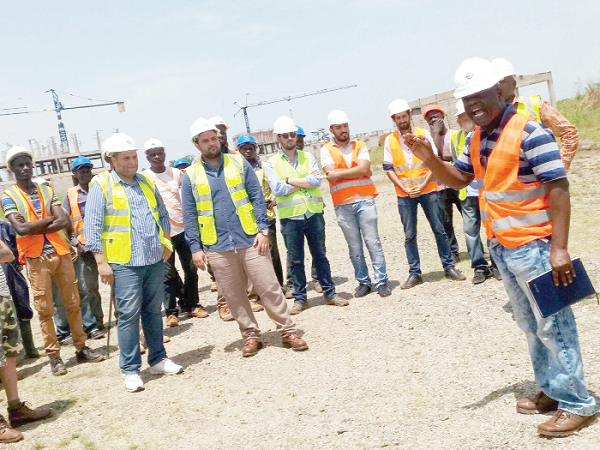
Euroget to hand over hospital projects
Four out of nine medical facilities being constructed by Euroget De-Invest, s.a., an Egyptian capital investment company, are set to be handed over to the government of Ghana by the end of the year.
They are the 160-bed Regional Hospital in Wa, the 100-bed District Hospital at Madina, the 60-bed District Hospital at Nsawkaw and the 60-bed District Hospital at Tepa in the Ashanti Region.
Advertisement
The rest, three 60-bed District Hospitals at Twifo Praso, Konongo and Salaga, a 250-bed Regional Hospital in Kumasi and a 500-bed Regional Military Hospital in Kumasi, will be handed over subsequently between January and July, 2019. The nine hospitals are expected to add 1310 beds as well as other modern facilities to health infrastructure in the country.
The physical structures for the hospitals have been completed while equipment for the Wa, and Madina hospitals are in the country, according to the Country Manager of Euroget De-Invest, s.a., Mr Prince Armah.
The medical facilities, which feature a string of sophisticated installations – including an oxygen-generating system that feeds relevant sections of the facility with the gas; a centralised and computerised air-conditioning mechanism that can process fresh air and release it to replace existing air in the enclosed areas of the hospital; and a multiple-source water system – make the hospital a gratifying investment.
 Aerial view of the Wa Regional Hospital
Aerial view of the Wa Regional Hospital
Wa Hospital
The Wa Hospital, for example is a masterpiece of architecture and modern equipment that is expected to bring a lot of relief to the people in the Upper East Regional capital and its peripherals.
A Daily Graphic journalist who accompanied an Euroget team to visit the Hospital some time in June this year, Mr Michael Quaye, noted that although it was by no means the largest health facility in Ghana, “the new Upper West Regional Hospital may well serve a modest definition of modernity when it becomes operational later this year”.
“The Wa Hospital features a combination of single storey and high-rise structures spread about on a 133,000m² land area, and connected by a fine network of disability-friendly walkways, with an attractive green of growing grass on the outside of the walls in between the drainage system.
It hosts 12 different clinics – including pediatric, maternal health, ear, nose and throat (ENT), and dental facilities, with an accompanying pharmaceutical department that has a storage space fitted with drug-preserving refrigerating equipment.
It also boasts seven different theatres: four of them on a surgical suite, two at the obstetrics and gynecology department, and one at the emergency and casualty department.
There is an administrative block, an emergency/casualty unit, a radiology unit, a laboratory and blood bank, a physiotherapy unit, a burns unit, an intensive care unit, a three-storey in-patient block, a mortuary facility, three structures of 20-unit staff accommodation, and a parking space for 300 cars.
While these are somehow standard facilities required at any health centre, Ghana's peculiarly challenged health system – where only the out-patient department (OPD) is guaranteed in many parts of the country – has made them luxury provisions for both health professionals and patients.
In some cases, they exist only in improvised forms to provide the relevant services to patients in the absence of an alternative facility in the neighbourhood. The facility will be able to accommodate eight simultaneous deliveries, with backup power plants, a laundry that will serve both staff and patients, a hospital kitchen, and a maintenance unit, making it a complete whole.
Primarily, it is going to be a referral facility for all of Upper West Region and beyond to treat more complex health conditions, but the $61 million investment as priced originally since 2008 without any additional variations required by Euroget De-Invest, s.a., will also employ professionals across the health service delivery scope”, Mr Quaye noted.
This description of the Wa facility, which is expected to be handed over in October, fits the description of virtually all the hospitals being constructed by Euroget.
Madina Hospital
For example, the Madina District Hospital, located at Kwabenya, which is expected to be handed over on November 15, will serve communities in and around Madina, Kwabenya, Adenta and beyond to save the residents of these areas from travelling longer distances to seek medical care.
The multi-million-dollar facility built on a 130,000m2 metre land has departments such as Administration, Maintenance, Operation Theatres, Emergency and Casualty Departments, Physiotherapy, Water Treatment Plant, a Mini-market, and a security post.
It also encompasses an Out Patient Department, Laboratory and Blood Bank, a Delivery Suite, In-patient Ward, Staff Dinning, an Outdoor Cooking and Preparation area, Power Station, Maintenance Department, Laundry, Mother’s Housing, Mortuary, among others.
According to Mr Amah, contrary to public perception that the work on the hospital projects had come to a standstill, the contractors were on site to ensure that the facility was completed on time for the hand over.
 The administration block at the Afari Military Hospital
The administration block at the Afari Military Hospital
Ashanti Regional Military Hospital
The Afari Military Hospital is a 500-bed facility being constructed at a cost of $180 million.
When completed, it would have a residential facility for the medical staff, kitchen, laundry, mortuary and a primary health care facility and would serve as a referral centre.
It started in 2014 and should have been completed within 47 months but is now scheduled to be completed and initially handed over to the government in March 2019. The final hand over is June, 2019.
The Hospital projects
In 2008, Euroget De-Invest s.a (EDI) of Egypt, the Egyptian capital investment company, with special expertise in structuring and arranging project finance and investment initiatives, entered Ghana and prospected for social infrastructural projects, specifically hospitals.
Euroget faced general challenges due to changes in government in Ghana 2009 and 2014. Euroget was granted the tax waiver which it required only in 2016.
The value for money (VFM) audit on the contract was conducted by Crown Agents of the United Kingdom (UK) and successfully concluded in 2009. Consequently, the Turnkey EPC contract for the nine hospitals was finalised in 2010. The Turnkey EPC contract is being financed by a supplier’s credit facility, secured by promissory notes issued by the Ministry of Finance (MoF).
 Aerial view of the Madina District Hospital situated at Kwabenya. Pictures: DOUGLAS ANANE-FRIMPONG
Aerial view of the Madina District Hospital situated at Kwabenya. Pictures: DOUGLAS ANANE-FRIMPONG
Supplier Credit Facility
The supplier credit facility (SCF) was arranged on concessional terms, providing sufficient financial savings for the Republic of Ghana. The supplier’s credit facility, signed between MoF and EDI contains the terms and conditions for the concessional funding.
The project involved the construction of nine modern fully functional hospitals including a 500-bed military hospital, two regional hospitals in Wa and Kumasi, and six district hospitals at Salaga, Twifo Praso, Madina (now at Atomic/Kwabenya), Konongo, Nsawkaw and Tepa.
The nine hospitals involved the Ministries of Health (eight hospitals) and Defence (one military hospital in Kumasi)
Euroget De-Invest successfully went through the regulatory processes and duly procured the contract, after processing the same through the various ministries, Cabinet and Parliamentary approvals in 2008. Further, commercial and supplier credit agreements were signed in 2008.
The supplier credit facility and its terms and conditions are being implemented, monitored and available at the MoF. All payments under the contract are made in accordance with the agreed terms of the supplier’s credit agreement.
Subsequent to the VFM audit in 2009, the commercial contract with the Ministries of Health and Defence were finally concluded in 2010, pending various conditions precedent for effectiveness. Various pre-conditions for the effectiveness of the commercial contract and supplier’s credit agreement have been strenuously pursued.
These pre-conditions include; the issuance of agreed Promissory Notes in accordance with the agreement, which was obtained in February 2012 and final legal opinion of the Attorney-General for the finance guarantees in February 2014, signifying full effectiveness of supplier credit facility.
Other pre-conditions for commercial contract with the Ministries of Health and Defence included the release of lands and grant of access to sites for the hospitals, which were obtained on various dates, the last release being in 2014, and grant of final tax exemption by Parliament in December 2016.
The execution of the hospitals project, scheduled in two phases and commenced at different dates, are now on schedule and it is expected that all the nine projects would be handed over by August next year.



